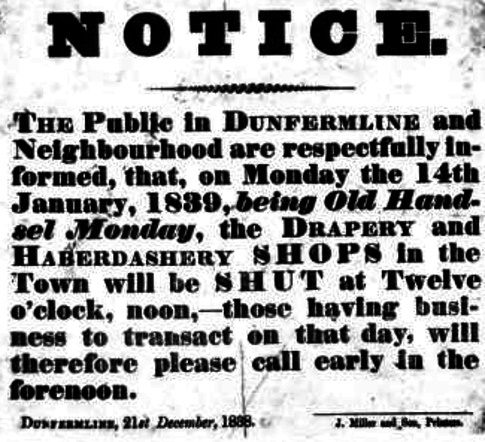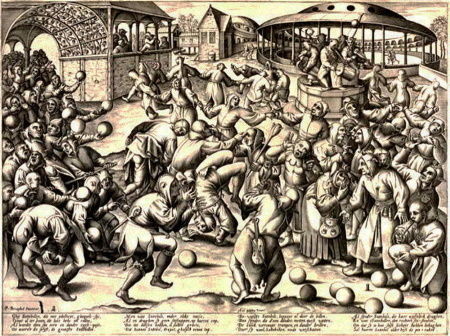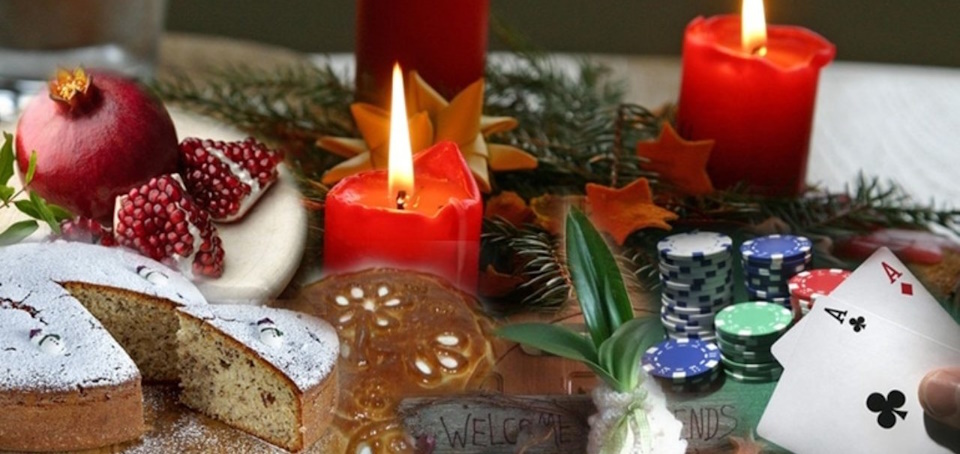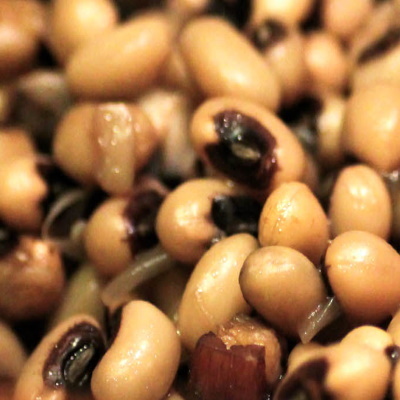New Year's Traditions - Kirkwall Ba' & Handsel Monday
Written by Anne Newman 7th January 2020 and updated 2021 & 2023
The Winter Solstice is the turning point of the year, beginning the lengthening of days. It has long been viewed as the birth of the year - by pagans celebrating the return of the Sun, and by Christians welcoming the birth of the Son of God. The days between Solstice and the New Year are a magical period when anything is possible.
In England, the Twelve Days of Christmas were considered omen days which could be used to predict the weather in the coming year.
in Ireland, tradition held that if a person died during the Twelve Days, he or she went straight to Heaven.
Everything has significance on New Year's Day, the first person to cross your threshold after midnight brings luck to the household in the British Isles. Read more at 31st December - New Year's Eve.
In Scotland, the best possible "first-footer" was a tall, handsome, dark haired man, who brought gifts of whisky, bread, a piece of coal or firewood, and a silver coin. He entered in silence, and no one spoke to him until he put the coal on the fire, poured a glass of whisky for the head of the house and wished everyone a Happy New Year.
Also in Scotland, no court had power during these days.
According to British folklore, you should not sweep on New Year's Day, or you will sweep your good luck away, or take anything out of the house - even rubbish and waste. You only want to bring new things in to ensure abundance in the coming year. If you must carry something out, be sure to bring something else in first, preferably a coin concealed outside the previous night. As this medieval poem reminds us:
Take out, then take in,
Bad luck will begin.
Take in, then take out,
Good luck comes about.
First Monday of the New Year - Handsel Monday

Dunfermline Historic Society - Auld Handsel
The first Monday in the year when a present or handsel was given by a master or mistress to the servants, and by fathers or mothers to children.
On that day people salute one another with “My Handsel on you.”
The actual date in any given year can be anywhere between January 1st and 7th.
This is an adopted Christmas tradition in Ireland, lesser known and slowly dying out.
The day mainly used to be celebrated in Scotland and northern England, but it made it across the Irish sea with immigrants and settlers. It was an occasion for gift giving at the start of the New Year, and it remained a Scottish tradition from the 14th until the 19th century. Later, it was replaced in the United Kingdom by Boxing Day that is celebrated a day after Christmas Day and is celebrated in a number of countries that previously formed part of the British Empire.
What Is Handsel?
"Handsel" is believed to have its roots in the Saxon language, with a meaning of "delivering something into the hand". A handsel, in this case, is a kind of dues to be paid. Rather than a large tax, the meaning of the word is nearer to a small gift, either money or goods, more as a token to ensure good luck from the beginning of the year. In other words, a handsel would be a gift to mark and bless a beginning. The recipient feels lucky but the giver also avoids a spell of bad luck themselves.
The Tradition
In the 19th century, Handsel Monday was the day it was customary to give both children and servants a present. There were other superstitions about what would be an appropriate kind of gift to bring good luck while avoiding bad luck. For example, the gift should never be a sharp object because something sharp might "cut the ties". This kind of rule for gift-giving is seen in some other cultures as well, including at the start of Chinese New Year.
Another important rule attached to gifts on Handsel Monday concerned purses. If you gave a gift of a purse or a wallet, in order to ensure that the person using it in the future would never find it empty, it was customary to place a coin in it.
As Handsel Monday evolved, it became the day that tips were given to all of the servants of the house. It was not only the live-in servants who received money this day, but also the day to tip all service providers who came to the house on a regular basis - newspaper boys, the rubbish collectors, the postman, delivery boys from the local butchers, bakers and possibly candlestick makers as well.
In the 21st century, Handsel Monday is all but forgotten in Ireland, though in some families children are still handed small gifts on this day.

Reversing the Rules
In ancient Babylon, the days between the Winter Solstice and the New Year were seen as the time of a struggle between Chaos and Order, with Chaos trying to take over the world.
Hindu, Chinese, Celtic cultures viewed this as a time for reversing order and rules - high ranked persons and officials would change roles with servants or dress in costumes for a time until order was restored.
(This engraving, by Pieter van der Heyden dated in the last part of 16th century, depicts the Feast of Fools. Some deemed that this was unseemly behaviour, and the Feast was banned in the 15th century, but is still mentioned in The Hunchback of Notre Dame by Victor Hugo written in the 1800's.)
In France, the children knock on their parents' bedroom door, pretending to personify health, abundance and joy, which the parents welcome.
Food
Food eaten on New Year's Day is said to affect the quality of the coming year. The ancient Romans exchanged bay and palm branches hung with sweets, dates, figs and gilded fruits. The items hung on the branch expressed hopes the new year would be sweet, fertile, and prosperous.
The pig is the symbol of good luck in Vienna, Austria. Pigs are let loose in restaurants and everyone tries to touch them for luck as they run by. In private homes, a marzipan pig, with a gold piece in its mouth, is suspended from a ribbon and touched instead.
In Greece, it's customary to throw a pomegranate wrapped in silver foil on the threshold, to spread the seeds of good luck for an abundant year.

In Spanish-speaking countries, people put twelve grapes into their wine or champagne glass at midnight. The grapes represent the months of the old year and the new one. At the stroke of midnight, after toasting each other with the wine, people eat the grapes as quickly as possible, making a wish on each one.
Neapolitans still wrap dried figs in laurel leaves and exchange them as a kind of insurance of abundance for the coming year. They also make confections of caramelized dough and tiny almond pieces, so the year will be sweet.
Italians also serve lentils, raisins, and oranges, symbols of riches, good luck, and the promise of love.

In the American South, it's traditional to eat cornbread, cabbage, and black-eyed peas on New Year's Day. The peas symbolize coins or copper money, the cornbread gold, and the cabbage green or folding money.
Although many of these customs may seem like superstitions, they all stem from a similar belief: by ending the old year with respect and beginning the new one in the way we would like it to begin, we establish our intentions for the new year.
For more information on foods and this time of year visit Serious Eats - New Year's good luck foods
The Kirkwall Ba'
Every Christmas And New Year's Day a football game is played en masse in the streets of the town of Kirkwall in Orkney, Scotland. The game is played with a cork-stuffed leather ball known as the ba'. The whole affair is a chaotic and rather brutal affair which is why every Christmas Eve and Hogmanay, householders and shopkeepers along Kirkwall's winding central streets can be seen barricading doors and windows in preparation for the following days' ba' games.
When the games first started, the men and boys of Royal Burgh of Kirkwall were split into two rival teams, the Uppies and the Doonies, aka the "Up-the-Gates" and the "Doon-the-Gates" . This is thought to be a corruption of the Old Norse gata, meaning road. To be an Uppie or Doonie depended on the person's place of birth, so those born to the north of the cathedral were 'Doonies', with those born south were the 'Uppies'.
Today the players take the sides of their father and great-grandfathers, regardless of where they now live. The entire town of Kirkwall effectively becomes the pitch.
As the cathedral clock strikes 1pm, a specially chosen individual, throws the ba' from the Mercat Cross into the gathered crowd of players. As soon as it lands in the pack, the game starts and each side trying to gain ground and carry the ba' towards their target goal.
The Doonies' goal is the sea, within the Basin of the Harbour, but so long as it is immersed in the salt water of Kirkwall Bay, the Ba has gone doon.
The Uppies must "round the Lang", which used to be the site of the old town gates.

There are no hard and fast rules. A typical game can last about five hours, but could be anything up to eight hours, or more. Although the game is fairly rough, tempers are usually held in check and foul play, or "inappropriate behaviour", is not tolerated. A tight scrum forms around the leather trophy and the streets now their playing field, a heaving throng of men push and pull to try and gain a few metres nearer their goal. More often than not, no one can see the Ba' and so there are numerous attempts to smuggle the ba' out of the pack or create fake "breaks" in the hope that the other team will follow the wrong players.
A successful break allows players to sprint towards their goal, making the most of Kirkwall's winding lanes to slow down pursuers. Players have even been known to try to head along the rooftops to reach their goals.The game continues until either side reaches their goal and then the ba' becomes the coveted trophy and is awarded to a player who has been a notable participant over the years.
The ba' itself is a handmade, cork-filled, leather ball. Each game is played with a new ba', each one made by one of a few Orcadian ba' makers.
A finished Men's ba' weighs about 3 lbs with a circumference of approximately 28 inches. The Boys' Ba' is slightly smaller.
"It breaks out twice a year at a time when peace and goodwill might be expected to prevail, the warring armies engaging in close combat with a ferocity that precludes respect for person or property.
"Even the law has been known to stand impotent as combatants surged and counter-surged through the environs of the police station, and memory has hardly dimmed the occasion when the local manse was invaded and despoiled. Casualties are high — but who cares?
"Crushed ribs and broken limbs are never enough reasons for the enthusiastic participants to desist from this traditional orgy of Orcadian violence which not even a sheriff's edict could ban — the Kirkwall Ba' Game."
---oOo---
And a personal one from Bernadette Mac - A very good friend made one up of her own tradition- she kicked the calender out the back door and then set fire to it.
If you have any traditions you can share please email them to email@taracelebrations.org and we will post them here.





